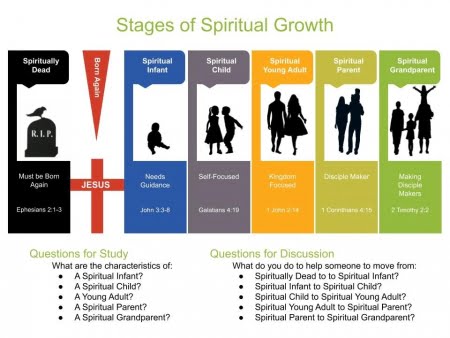In the rich tapestry of Bahá’í teachings, the concept of spiritual growth is paramount. At the crux of this eclectic philosophy lies the notion that humanity is in a constant state of evolution, not just physically or intellectually, but spiritually as well. The Bahá’í writings articulate a profound framework of spiritual growth characterized by seven distinct stages, each challenging the individual to manifest qualities that lead to both personal development and the betterment of society. How can one navigate these stages effectively? Are we ready to embrace the rigorous yet rewarding journey of spiritual advancement?
Before diving into the intricacies of these stages, it is essential to grasp the underlying philosophy that informs the Bahá’í view of spiritual growth. Spirituality, within this tradition, is perceived not merely as an abstract concept but as a tangible, practical process aimed at instilling virtues that elevate one’s character and foster harmony in the world. This perspective necessitates a willingness to engage in self-reflection and to challenge the status quo.
To embark on this profound journey, individuals grapple with self-awareness, the first stage of spiritual growth. Self-awareness transcends mere acknowledgment of one’s emotions or thoughts; it necessitates a comprehensive understanding of one’s inner landscape. Cultivating self-awareness involves examining one’s motivations, biases, and behaviors. This conceptual scrutiny often serves as a mirror, reflecting the individual’s strengths and weaknesses. Thus, the playful question emerges: Are we prepared to confront the shadows of our own psyche, or do we prefer to live with the comforting veil of ignorance?
The second stage centers on detachment, which distinguishes the spiritually inquisitive individual from the mundane pursuits of materialism. Detachment is not a withdrawal from the world or its pleasures but a conscious decision to prioritize spiritual over material satisfaction. This paradoxical notion fosters a sense of freedom, as it liberates the individual from the chains of superficial desires. Herein lies a challenge; how does one strike a balance between enjoying worldly experiences and maintaining an unwavering focus on spiritual elevation?
Progressing to the third stage, we encounter the theme of service—a core tenet of Bahá’í teachings. Engaging in acts of service catalyzes spiritual growth as it propels individuals beyond self-centeredness. Service engenders a deep sense of connection with humanity, fostering empathy and compassion. It is in the act of giving that one often discovers their inherent nobility. Yet, one must ponder: In a world that often celebrates individual achievement, how do we cultivate a culture of altruism and collective wellbeing?
The fourth stage emphasizes the acquisition of knowledge. The significance of knowledge in the Bahá’í teachings cannot be overstated. Knowledge is depicted as a divine attribute, essential for understanding the truth and navigating life’s complexities. This stage implores individuals to transcend ignorance and to seek truth in all its manifestations. Yet knowledge acquisition poses a unique conundrum: How does one discern true knowledge amidst a cacophony of information, particularly in the digital age?
With a solid foundation in personal growth established, individuals transition to the fifth stage: the development of virtues. Virtues such as honesty, humility, and courage form the moral backbone of Bahá’í teachings. This stage is akin to a gardener tending to their plants; nurturance is crucial for flourishing. Each virtue cultivated aids in the growth of one’s character, enabling smoother interactions and relationships. Reflect on this: Are we prepared to cultivate virtues in a world that often celebrates vices as strengths?
The sixth stage is characterized by the promotion of unity. This concept is integral to Bahá’í philosophy, positing that the oneness of humanity is paramount for spiritual growth. Each individual is not only a member of their community but a vital part of the global tapestry. This stage challenges the individual to reach beyond personal boundaries and to nurture a sense of belonging to the larger community. As we grapple with this principle, we must ask, how can we cultivate a genuine sense of unity in a landscape rife with division?
Finally, the seventh stage culminates in the realization of one’s spiritual purpose. This stage is perhaps the most profound, as it encapsulates the essence of spiritual growth. Understanding one’s purpose directs all prior experiences and learnings towards a congruent life vision. This acknowledgment empowers individuals to live authentically and to contribute meaningfully to society. However, the ultimate conundrum remains: How does one discover their purpose amidst the myriad of voices and distractions saturating contemporary life?
In conclusion, the path of spiritual growth in Bahá’í teachings is not linear; it is a profound journey requiring dedication and introspection. Each stage compels the aspirant to confront personal challenges while simultaneously fostering broader societal change. By embracing the lessons inherent in these stages, individuals embark on a path marked by enlightenment, service, and a commitment to unity. The question resonates: Are we willing to embark on this transformative journey, armed with the courage to evolve spiritually for ourselves and for humanity as a whole?
